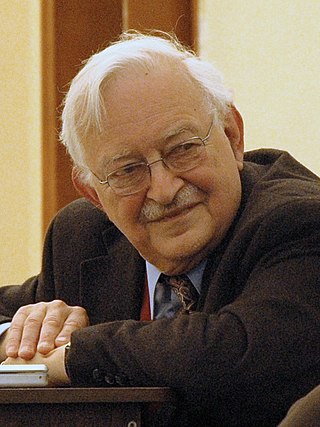
Manuel Castells Oliván is a Spanish sociologist. He is well known for his authorship of a trilogy of works, entitled The Information Age: Economy, Society and Culture. He is a scholar of the information society, communication and globalization.

Immanuel Maurice Wallerstein was an American sociologist and economic historian. He is perhaps best known for his development of the general approach in sociology which led to the emergence of his world-systems approach. He was a Senior Research Scholar at Yale University from 2000 until his death in 2019, and published bimonthly syndicated commentaries through Agence Global on world affairs from October 1998 to July 2019.

Economic sociology is the study of the social cause and effect of various economic phenomena. The field can be broadly divided into a classical period and a contemporary one, known as "new economic sociology".

World-systems theory is a multidisciplinary approach to world history and social change which emphasizes the world-system as the primary unit of social analysis.
Transnationalism is a research field and social phenomenon grown out of the heightened interconnectivity between people and the receding economic and social significance of boundaries among nation states.

In political and sociological theory, the elite are a small group of powerful people who hold a disproportionate amount of wealth, privilege, political power, or skill in a group. Defined by the Cambridge Dictionary, the "elite" are "those people or organizations that are considered the best or most powerful compared to others of a similar type."

Historical sociology is an interdisciplinary field of research that combines sociological and historical methods to understand the past, how societies have developed over time, and the impact this has on the present. It emphasises a mutual line of inquiry of the past and present to understand how discrete historical events fit into wider societal progress and ongoing dilemmas through complementary comparative analysis.
Evelyn Seiko Nakano Glenn is a professor at the University of California, Berkeley. In addition to her teaching and research responsibilities, she served as founding director of the university's Center for Race and Gender (CRG), a leading U.S. academic center for the study of intersectionality among gender, race and class social groups and institutions. In June 2008, Glenn was elected president of the 15,000-member American Sociological Association. She served as president-elect during the 2008–2009 academic year, assumed her presidency at the annual ASA national convention in San Francisco in August 2009, served as president of the association during the 2009–2010 year, and continued to serve on the ASA governing council as past-president until August 2011. Her presidential address, given at the 2010 meetings in Atlanta, was entitled "Constructing Citizenship: Exclusion, Subordination, and Resistance", and was printed as the lead article in the American Sociological Review.

Sociology is a social science that focuses on society, human social behavior, patterns of social relationships, social interaction, and aspects of culture associated with everyday life. More simply put, sociology is the scientific study of society. It uses various methods of empirical investigation and critical analysis to develop a body of knowledge about social order and social change. While some sociologists conduct research that may be applied directly to social policy and welfare, others focus primarily on refining the theoretical understanding of social processes and phenomenological method. Subject matter can range from micro-level analyses of society to macro-level analyses.

Teivo Teivainen is professor of World Politics at the University of Helsinki. Having received his PhD in 2000 at the University of Helsinki, Teivainen became the founding director of the Program on Democracy and Global Transformation at the National University of San Marcos, in Lima, Peru in 2003.

Stephen Gill, FRSC is Distinguished Research Professor of Political Science at York University, Toronto, Ontario, Canada. He is known for his work in International Relations and Global Political Economy and has published, among others, Power and Resistance in the New World Order, Power, Production and Social Reproduction, Gramsci, Historical Materialism and International Relations (1993), American Hegemony and the Trilateral Commission (1990) and The Global Political Economy: Perspectives, Problems and Policies.
Alberto Martinelli is a scholar of social sciences, President of the International Social Science Council, former 14th president of the International Sociological Association (1998-2002) and professor of Political Science and Sociology at the University of Milan.
The Journal of World-Systems Research (JWSR) is a biannual, open access, peer-reviewed academic journal in the field of world-systems analysis, established in 1995 by founding editor Christopher Chase-Dunn at the Institute for World-System Research at the University of California at Riverside. As of 2015, it is published by the Political Economy of the World-System (PEWS) Section of the American Sociological Association and by the University Library System, University of Pittsburgh. The journal's current editor-in-chief is Andrej Grubačić.
Xiangming Chen served as the founding dean and director of urban and global studies and director of the Center for Urban and Global Studies at Trinity College in Hartford, Connecticut, from 2007 to 2019. He is currently the Paul E. Raether Distinguished Professor of Global Urban Studies and Sociology at Trinity College. Prior to this, Chen served as assistant to full professor of sociology and adjunct professor of political science and urban planning and policy at the University of Illinois at Chicago.

John Peter Scott is an English sociologist working on issues of economic and political sociology, social stratification, the history of sociology, and social network analysis. He is currently working independently, and has previously worked at the Universities of Strathclyde, Leicester, Essex, and Plymouth. He is a Fellow of the British Academy, a Fellow of the Royal Society of Arts, and a Fellow of the Academy of Social Sciences. He has been a member of the British Sociological Association since 1970. In 2015 he became Chair of Section S4 of the British Academy. In 2016 he was awarded an Honorary Doctorate of Essex University.
Cultural studies, also called the cultural sciences, is an interdisciplinary field or scientific branch that explores the dynamics of contemporary culture and its historical foundations. Cultural studies researchers generally investigate how cultural practices relate to wider systems of power associated with, or operating through, social phenomena. These include ideology, class structures, national formations, ethnicity, sexual orientation, gender, and generation. Employing cultural analysis, cultural studies views cultures not as fixed, bounded, stable, and discrete entities, but rather as constantly interacting and changing sets of practices and processes. The field of cultural studies encompasses a range of theoretical and methodological perspectives and practices. Although distinct from the discipline of cultural anthropology and the interdisciplinary field of ethnic studies, cultural studies draws upon and has contributed to each of these fields.
Trade globalization is a type of economic globalization and a measure of economic integration. On a national scale, it loosely represents the proportion of all production that crosses the boundaries of a country, as well as the number of jobs in that country dependent upon external trade. On a global scale, it represents the proportion of all world production that is used for imports and exports between countries.
Shatakshee Ramesh Dhongde is an associate professor at the School of Economics, Ivan Allen College of Liberal Arts, Georgia Institute of Technology. She has provided research papers to the several institutions including the International Monetary Fund and the World Institute for Development Economics Research (WIDER). Her work has also appeared in several academic journals including World Development.
József Böröcz is a sociologist who is currently Professor of Sociology at Rutgers University. He earned his PhD in Sociology at The Johns Hopkins University in 1992. He has a Dr. Sc. degree from the Hungarian Academy of Sciences (2004). According to Google Scholar, Böröcz's H-Index score is 30.
James V. Fenelon is an American sociologist, poet, author, and academic. He is Professor of Sociology, Director of the Center for Indigenous Peoples Studies at California State University, San Bernardino, and Lang Visiting Professor for Social Change at Swarthmore College. His personal and professional life has revolved around his Native (Dakota/Lakota) heritage from North Dakota.










